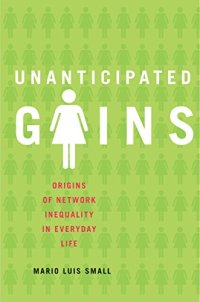
Ebook: Unanticipated Gains: Origins of Network Inequality in Everyday Life
Author: Mario Luis Small
- Genre: Other Social Sciences // Sociology
- Tags: Processes & Infrastructure, Customer Relations, E-Commerce, Facility Management, Government & Business, Green Business, Information Management, Infrastructure, Office Automation, Office Equipment & Supplies, Office Management, Operations Research, Organizational Change, Organizational Learning, Purchasing & Buying, Research & Development, Strategic Planning, Structural Adjustment, Business & Money, Marriage & Family, Sociology, Politics & Social Sciences, Urban, Sociology, Politics & Social Sciences, Specialty Boutique
- Year: 2009
- Publisher: Oxford University Press
- Language: English
- epub
Social capital theorists have shown that some people do better than others in part because they enjoy larger, more supportive, or otherwise more useful networks. But why do some people have better networks than others? Unanticipated Gains argues that the practice and structure of the churches, colleges, firms, gyms, childcare centers, and schools in which people happen to participate routinely matter more than their deliberate "networking."
Exploring the experiences of New York City mothers whose children were enrolled in childcare centers, this book examines why a great deal of these mothers, after enrolling their children, dramatically expanded both the size and usefulness of their personal networks. Whether, how, and how much the mother's networks were altered--and how useful these networks were--depended on the apparently trivial, but remarkably consequential, practices and regulations of the centers. The structure of parent-teacher organizations, the frequency of fieldtrips, and the rules regarding drop-off and pick-up times all affected the mothers' networks. Relying on scores of in-depth interviews with mothers, quantitative data on both mothers and centers, and detailed case studies of other routine organizations, Small shows that how much people gain from their connections depends substantially on institutional conditions they often do not control, and through everyday processes they may not even be aware of.
Emphasizing not the connections that people make, but the context in which they are made, Unanticipated Gains presents a major new perspective on social capital and on the mechanisms producing social inequality.
Exploring the experiences of New York City mothers whose children were enrolled in childcare centers, this book examines why a great deal of these mothers, after enrolling their children, dramatically expanded both the size and usefulness of their personal networks. Whether, how, and how much the mother's networks were altered--and how useful these networks were--depended on the apparently trivial, but remarkably consequential, practices and regulations of the centers. The structure of parent-teacher organizations, the frequency of fieldtrips, and the rules regarding drop-off and pick-up times all affected the mothers' networks. Relying on scores of in-depth interviews with mothers, quantitative data on both mothers and centers, and detailed case studies of other routine organizations, Small shows that how much people gain from their connections depends substantially on institutional conditions they often do not control, and through everyday processes they may not even be aware of.
Emphasizing not the connections that people make, but the context in which they are made, Unanticipated Gains presents a major new perspective on social capital and on the mechanisms producing social inequality.
Download the book Unanticipated Gains: Origins of Network Inequality in Everyday Life for free or read online
Continue reading on any device:

Last viewed books
Related books
{related-news}
Comments (0)